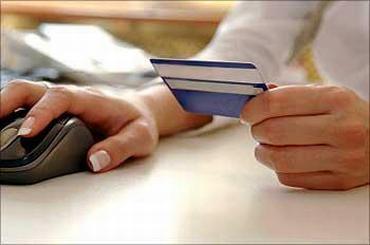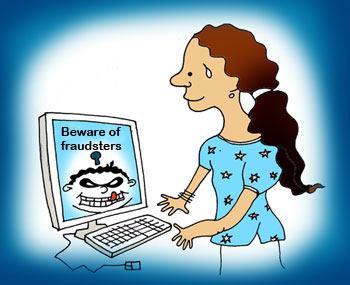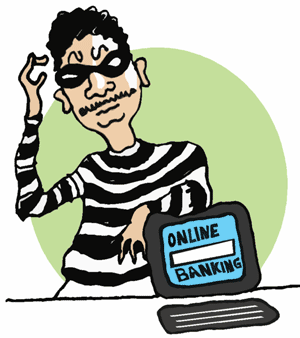 | « Back to article | Print this article |
Protect yourself from online and credit card fraudsters
Basic precautionary tips to save you from online and credir card fraudsters
To ensure safe banking experience, we need to be cautious about how we utilise the online banking facility or credit card facility. Mentioned below are some of the basic precautionary tips that will help you to take maximum benefit of the banking facilities.
Authentic Internet Security Suite Software
Increasing usage of Internet has led to the increase in cyber threats. Hence, to ensure protection from evolving threats it is vital to secure the computer and have it protected at all times. The importance of an anti-virus can never be underestimated; however the domain of an anti-virus is limited. Hence, ensure that all your digital devices, be it computer, laptop or smartphones, all are secured with an efficient Internet Security Suite, which will protect you not only from file-based threats but also from Internet.
Also, ensure that your operating system, applications and browsers are regularly updated with patches and virus definitions.
The author is MD and CEO of eScan
Protect yourself from online and credit card fraudsters
Secured internet connection
Always use a secured Internet connection. In case of using a wireless network, ensure that your network security settings are in place.
Strong password
Always keep your passwords secret. Make it a practice to change your account password or ATM PIN at regular intervals.
Also, ensure that your account passwords or ATM PIN should not be easily predictable. It is advisable to have account password of at least 8 characters long and a combination of numbers and alphabets.
Secure your information
Never respond to any e-mails that request personal information as banks never ask for your personal details through an e-mail. It may be sent by identity thieves to steal your confidential information.
Also, never provide your bank account or credit card information unless you are banking or shopping through a legitimate Web site. Keep your bank account detail safe. Avoid writing them down as it may fall into the wrong hands. Never fill application forms for credit cards or new bank accounts or services received in e-mail, as it may be a trick by identity thieves to steal your confidential information. Every time you login to your online banking account, check your last login and logout record.
In case of using a credit card, never share your personal information with merchants.
Protect yourself from online and credit card fraudsters
Be cautious of phishing e-mails
Scammers use this technique often to obtain your personal details. They may promise you a credit card over the telephone as they may intend to charge your existing credit card without sending you anything. They may even promise you specific discounts or items or services and when you send your credit card information, but you may never hear from them.
Also, beware of sudden disruption in your e-mail service from banks. In such scenarios, get in touch with your bank to confirm if they have received any recent request for a 'change of e-mail ID', which you never initiated.
Be cautious of fraudulent web sites
Avoid accessing the bank accounts with the hyperlinks sent through e-mails. Rather access the bank web site by typing in the Web address directly in the address bar. Always ensure that you use online banking services of the banks that have encryption technology and good privacy policy. While banking online, check for URLs that begin with https, followed by a colon (:), and two slashes (//)).
Never ignore the warnings by your Internet browser about unsecured sites. In addition, avoid downloading/installing programme from unreliable sources or opening suspicious files or e-mails.
Also, it is advisable to validate the SSL Certificate. In case of any doubt, click on the lock icon at the bottom of the secured page. Once it displays the SSL certificate information in a new window, ensure that there is no 'red cross' mark preceding the title 'Certificate Information'.
Protect yourself from online and credit card fraudsters
Avoid shared computers
Avoid banking online from a shared computer in public such as Internet cafes, etc. as they may be infected with viruses, keyloggers or Trojans that can capture and transmit your personal data to cyber criminals.
In case of using a shared computer, make sure to disable 'File and Printer Sharing' option in the computer, when connected to the Internet. After you are done with online banking or shopping, make sure to 'logout' to exit from your account rather than just closing the browser. Also, it is advisable to clear the cache and browsing history.
Legitimate apps
In case you are using smartphone for online banking or shopping, make sure that your device has legitimate apps.
Protect yourself from online and credit card fraudsters
Keep an eye on your Bank statements and SMSs
Keep a tab of your bank statements or account balance and SMS alerts from banks. In case of any fraudulent or unusual charges that you do not recognise, immediately report it to your bank.
Use secure ATM machines
It is always advisable to use ATM machines that are under video surveillance or inside a bank lobby as chances of them being tampered are less. Ensure that you enter your PIN number in the ATM keypad by covering it.
In case you face any issues while performing transaction through the ATM machine, avoid taking help from anybody hanging around the ATM machine. If the ATM machine keeps your card, call the bank immediately and report it.
Credit card security
Make it a habit to keep receipts for your purchases and also keep track of charges reflecting on your monthly statement. In case of loss or theft of your credit card report it to your bank at the earliest.
Keep a list of all your cards and their numbers as it may be useful in the event of loss or theft. Never forget to take back your card after making the purchase. Also, make sure you sign the back of any new card as soon as you receive it and destroy any expired or unused cards.




